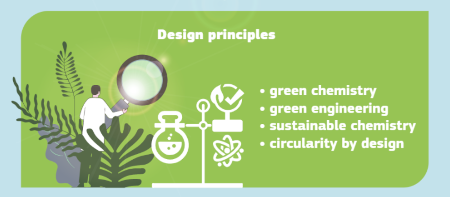The Commission Recommendation in a nutshell
The 'safe and sustainable by design' (SSbD framework) is a voluntary approach to guide the innovation process for chemicals and materials, announced on 8 December 2022 in a Commission Recommendation.
It aims to
- steer the innovation process towards the green and sustainable industrial transition
- substitute or minimise the production and use of substances of concern, in line with, and beyond existing and upcoming regulatory obligations
- minimise the impact on health, climate and the environment during sourcing, production, use and end-of-life of chemicals, materials and products
The framework is composed of a (re-)design phase and an assessment phase that are applied iteratively as data becomes available.
The (re-)design phase consists of the application of guiding principles to steer the development process. The goal, the scope and the system boundaries – which will frame the assessment of the chemical or material – are defined in this phase.
The assessment phase comprises of 4 steps: hazard, workers exposure during production, exposure during use and life-cycle assessment. The assessment can be carried out either on newly developed chemicals and/or materials, or on existing chemicals and/or materials to improve their safety and sustainability performance during production, use and/or end-of-life.
Sign up to the SSbD stakeholder community

- Presentation
- 11 May 2023
A European assessment framework. This Commission recommendation promotes research and innovation for safer and more sustainable chemicals and materials.
Test the framework
We are encouraging the engagement of relevant and willing stakeholders to support the progress of SSbD and adapt their innovation processes. The EU has started to implement SSbD under the Horizon Europe framework programme, but intends to continuously improve the methods, tools and data availability for ‘safe and sustainable by design’ chemicals and materials, as well as to refine the framework and make it applicable to a wide variety of substances.
The testing phase will allow us to establish a joint scientific reference base for safety and sustainability assessments that are necessary for innovation processes. It will also support the development of a fifth step on socioeconomic assessment. The engagement of the stakeholder community, and in particular the industry, is therefore crucial.
Support for the user
To help users apply the SSbD framework in practice:
- The JRC has published a Methodological Guidance that provides practical suggestions on the most commonly encountered issues when applying the framework
- the Partnership for the Assessment of Risks from Chemicals (PARC) has developed a toolbox that provides an overview of existing tools for each step of the framework
Who should participate?
The Recommendation is addressed to EU countries, industry, research and technology organisations (RTOs) and academia with each stakeholder group giving feedback on different actions.
Expected actions by EU countries
- promote the framework in national research and innovation programmes
- increase the availability of findable, accessible, interoperable, reusable (FAIR) data for safe and sustainable by design assessment
- support the improvement of assessment methods, models and tools
- support the development of educational curricula on skills related to safety and sustainability of chemicals and materials
Expected actions by industry, academia and RTOs
- use the framework when developing chemicals and materials
- make available FAIR data for safe and sustainable by design assessment
- support the improvement of assessment methods, models and tools
- support the development of professional training and educational curricula on skills related to safety and sustainability of chemicals and materials
What is in there for me?
You can have your say by being part of the development of a common understanding of what safe and sustainable chemicals and materials are and how to assess them.
You will benefit from regulatory preparedness by applying 'safe and sustainable by design' in your innovation process and bring SSbD to practice by promoting the framework as a common baseline and ensure that other initiatives build on it.
You can support the design and assessment of digital tools assessing safety and sustainability early in the innovation process and increase transparency of SSbD strategies to support sustainable finance and consumer awareness.
Timeline
- May - June 2023Feedback collection
- Winter 2023Workshop on collected feedback
- Spring 2024Guidance report v1
- May - August 2024Feedback collection
- Autumn 2024Workshop on collected feedback
- Winter 2025Guidance report v2
- 2025Revision of framework
Documents
